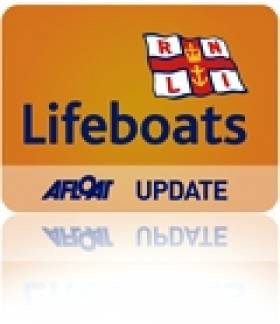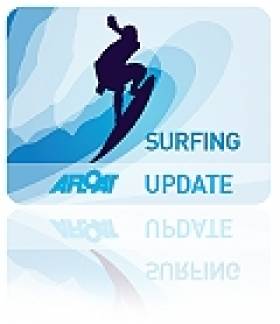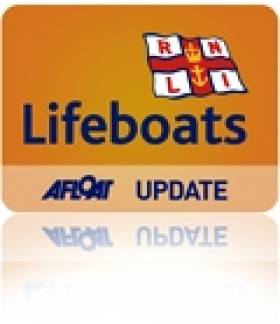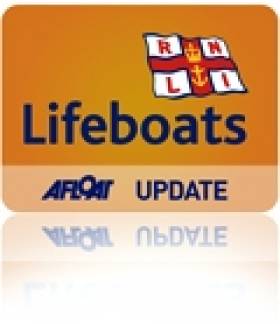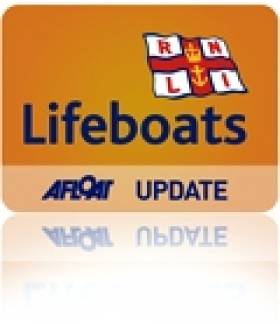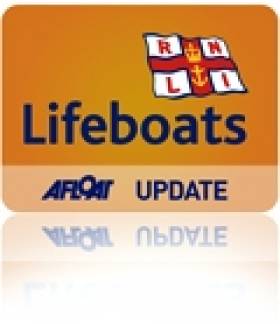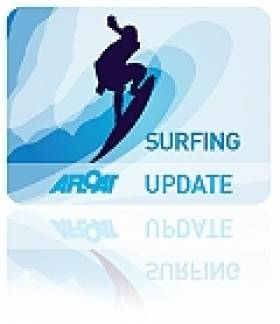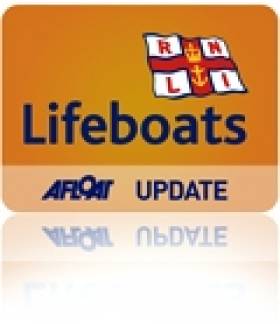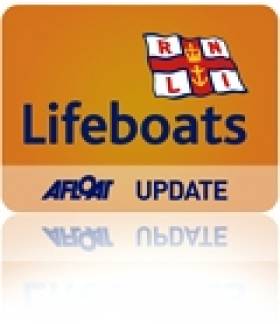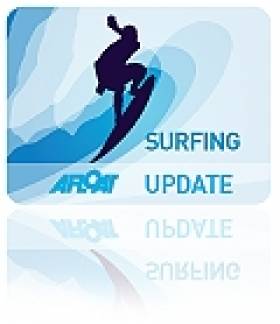Displaying items by tag: Portrush
RNLI Gallantry Medal Comes Home
#portrush – Tim Nelson's interest in all things connected with the RNLI has paid dividends in relation to the return of a silver gallantry medal presented to a local man for saving the life of a boy in Portrush in 1891.
Tim a keen collector and married to the Station's Press Officer, Judy Nelson was searching the web for images of RNLI issued medals as he had seen an unnamed RNLI bronze medal on eBay and was trying to work out if it was a modern copy or an original. As part of his on-going research Tim discovered a silver medal on the Internet awarded by the RNLI for bravery. As he read the accompanying history and the description of the medal he was surprised to find that the rescue that the medal had been awarded for had occurred in Portrush Harbour in 1891.
Tim said
'Obviously having an interest and connection with the Lifeboat Station in Portrush, I was very excited by the find. I contacted Robin Cardwell Lifeboat Operations manager to tell him and contacted the seller to express interest in the medal.'
Robin was keen to learn more and between himself, Tim, Des Austin, Coxswain, arrangements were made to purchase the medal to return it to its home Station in Portrush.
The medal was awarded by The Royal National Lifeboat Institution to: John Boyd Seaman who was not a crew member but a seaman living in Portrush. The full citation reads:
On 8 May 1891, while going out to his smack (small boat) which was at anchor in Portrush Harbour, a boy was thrown into the sea after his boat ran into another vessel's wake. John Boyd saw this from his position on another boat some 100 yards away. Despite being encumbered with his coat and sea boots, John Boyd jumped into the water and swam to the boy, as did fisherman David Patton, who, though twice as far away on shore, ran to the quay, threw off his coat, jumped in the sea and went to his aid. Boyd and Patton both supported the boy until a boat came from shore to further assist them. The RNLI voted John Boyd and David Patton its silver medal and accompanying vellum testimonial on 14 May 1891 The award was reported in various papers including the Belfast News-Letter, Saturday 16 May 1891).
John Boyd's medal has had quite a journey before returning to the home station. It formed part of the Watters Collection, sold at Glendinnings between 9-12 June 1913; it was subsequently part of the American Numismatic Society collection until 2006 and was sold for the ANS by Morton & Eden Auctioneers, 26 October 2006.
The medal was purchased by a collector Dr Roger Willoughby, who has a keen interest in lifesaving medals and is planning to write a book about Lifesaving Medals issued in Ireland. Dr Willoughby would be delighted to hear from anyone with any information that could assist him with his research. He can be contacted via email at [email protected]
Robin Cardwell Lifeboat Operations Manager commented:-
'We are delighted to have this medal back in Portrush were it first started out. It has had quite a journey around the world and we are so pleased that Tim found it and was able to assist in its return.'
The medal was purchased from crew funds and donations made by Willie Gregg as part of his on-going fundraising initiatives for Portrush Station and Willie's Orphan Fund
The medal will form part of the Stations history exhibition and can be seen on station open days.
'World's Biggest Waves' Off Irish Coast?
#SURFING - One of Ireland's top surfers claims he has found the world's biggest waves off the coast of Ireland.
As Irish Central reports, Portrush waverider Al Mennie says that he and surfing partner Andrew Cotton have found two waves reaching as much as 120 feet in secret locations off the coasts of Antrim and Donegal.
The duo are currently waiting for the right conditions to surf the biggest swells.
"The good days are few and far between – 90 percent of the swells are unrideable and we'd reckon that only two days each year are rideable," Mennie told the Irish Independent.
Their location is being kept under wraps for now due to safety concerns, as the waves crash down in a hazardous rocky area - making them definitely not suitable for novices.
Irish Central has more on the story HERE.
Portrush Lifeboats Rescue Four from Capsized RIB
Both Portrush Lifeboats were in action on Saturday afternoon (15th October) to rescue four people in an overturned boat at the Barmouth at Portstewart.
Both boats were launched at 15.50 hours on a wet dark afternoon after reports had been received of an overturned rib. When the Inshore boat arrived on scene there was a heavy 2 metre swell. Three people were on top of the rib and one in the water.
The volunteer ILB crew got the person in the water into the lifeboat by which time the All-weather lifeboat was on scene. All persons were then transferred to the ALB and taken to Portrush.
All were wearing wetsuits and did not require medical attention.
Robin Cardwell LOM stated
'This was a perfect example of team work between the two crews of the lifeboats from Portrush There was no hesitation in the volunteer crews responding to this shout. Each man knew what he had to do to bring the four people and their rib ashore'.
More from UK coastguard source here:
Belfast Coastguard received a '999' call from a member of the public at 3:48 pm informing them that they had witnessed a small boat capsize and there were people in the water. Coastguard Rescue Officers from Coleraine were sent to the scene. The Portrush inshore and all weather RNLI lifeboats were requested to launch and the Irish Coastguard rescue helicopter from Sligo was scrambled.
Steve Carson, Watch Manager, Belfast Coastguard, says:
"The inshore lifeboat was first on scene and discovered one person in the water and a further five people on the upturned hull of a Rigid Hull Inflatable Boat (RHIB). The conditions on scene were challenging with a large sea swell.
All six people have now been transferred to the all weather lifeboat and taken to Portrush Harbour and do not require further medical assistance.
The RHIB is being towed to harbour by the lifeboat.
We would like to remind the public that if they witness an incident along the shoreline or on the coast to ring '999' and ask for the Coastguard. Swift action from the member of the public this afternoon greatly assisted in the rescue of the six people in the water."
Portrush Raft Race Sets Sail this Weekend
The RNLI's 30th Portrush Raft Race takes place this weekend promises to deliver the usual fun frolics and madness around the Harbour from 11am on Saturday 28th May right through to Sunday 29th!
The weekend kicks off with the Junior Raft Race at 11am at the harbour, followed by music, street entertainment, The RNLI Roadshow making its first appearance at the Raft Race and a real coup for the committee.
This year for the first time also the RNLI Lifeguard team will be joining the crew for a spectacular safety display at sea, showing how all sections of the RNLI operate together to save lives.
Radio Ulster's Alan Simpson will be the compere for the day bringing his own style of wit and humour and boundless knowledge of local characters, interviewing rafters, crew, committee and sponsors.
To round it all off local band 'Wipe-out' have reformed to bring back a flavour of the Old Raft Race days.....who can forget them playing in blazing sunshine on the balcony of the yacht Club?
On Sunday there will be the Service of Thanksgiving followed by the madness and mayhem that is the Waiters Race....Come down and support your local bar people. This race gets so competitive it's unreal. Who will knock Sharman Crawford from the Ramore Wine Bar off his perch!
The Committee would like to thanks the Causeway SPAR retail group for their support both in time and money, and everyone else who has contributed to this 30th year of rafting!
Further details can be obtained by calling the Raft Race hotline 07969 814605
History - The First Portrush Raft Race
The Portrush Raft Race has its origins in a special relationship that existed between two Johns. One John (Scott) was closely involved in the day-to-day affairs of the Portrush Lifeboat; the other John (McNally) was the co-owner of the Harbour Bar in Portrush.
In summer 1981 John Scott brought into the Harbour Bar a Lifeboat Magazine containing an article about a Raft Race that the Oban Lifeboat Ladies Guild had successfully run as a fund raiser. John Scott showed the article to John McNally and both were in agreement that the West Bay would provide an ideal venue for running a similar fund raising event in Portrush. The matter rested for some months until there was a clearing-out of the bar shelves when the magazine re-appeared.
A letter was sent to the Oban Ladies Guild who were most helpful in providing copies of their rules and entry form along with some very valuable comments on their experience. The way was clear to start and all that was needed was some willing volunteers to help with the organisation. Regulars of the Bar offered their support and so the first Raft Race Committee was formed. Guinness offered to be the main sponsor which significantly helped in bringing the Portrush Raft Race to the public's attention. The spring bank holiday weekend was selected as it tied in with the Coleraine Borough Council's idea of having a Spring Bank Holiday Fair in Portrush.
An idea was hatched to have a Le Mann type start from the West Beach with crews standing at the water's edge and then sprinting up the beach to collect their rafts and head for the sea with the finish line at the Lifeboat in the harbour. It was agreed from the start that the focus would be family entertainment, rather than speed, with special emphasis being placed on raft design and crew costume.
The first race, which was held on Saturday 29th May 1982, attracted 39 entries with a number making a very special effort to design their rafts attractively. The rafts ranged from the most basic design to the resplendent Quinquireme of Nineveh complete with galley slaves, skeleton, albatross and shark. The ladies of the Fantasy Island also attracted considerable interest with their palm tree, grass skirts and badly fitting coconut shells. The sun shone and the wind from the South West was fresh providing a welcome assist for the tired crews.
The first across the line was the aptly named Portrush Flyer (J Porter, C Irwin, W Green, W Gallagher, N Gaile and N Gibson see above) followed by Titanic Raft 1 and Leonora. The first all ladies raft was also Leonora which was crewed by the girls from Dunluce School, Bushmills ( K Hunter, K Diamond, W Torrens, P McConaghy, S Boswell and M Parke). The best designed raft was Quinquireme of Nineveh ( B Magowan, C Woffinoin, D McKeown, A Creelman, N Adams and C Thompson) and the best costumed crew were Fantasy Island (M McFadden, V Haslam, J Sutchliffe, G Douglas, E Thompson and E Sutcliffe). There were other awards eg most humorous Titanic 1, Perseverance Titanic 2 and most important of all most sponsorship which went to the boys of Dunluce School Bushmills whose raft Big Berta raised over £650.
The first Raft Race rose over £3000 which was way beyond the committee's expectation and guaranteed the continuation of the event. In the 22 years that the two John's were involved the race grew from a Saturday afternoon event to an action packed Raft Race Weekend. Their involvement ceased after the death of John Scott in 2004. It is wrong to single out individuals but particular mention must be made of John and Fay Scott who gave the event the life that made it so enjoyable for all involved in the organisation. Margaret and Alan McFadden who also showed everyone how to enter the spirit of the event and have great fun. Finally mention must be made of Rosie Kirker Millar who sadly recently passed away. Rosie epitomised a can-do spirit and gave so much energy to the committee.
J McNally
May 2011
11 Kayakers Rescued by Portrush Lifeboat
The callers stated that they could see a group of twelve kayakers in difficulty off Portballintrae, Causeway Coast, Northern Ireland.
Belfast Coastguard called out the Coleraine Coastguard Rescue Team and requested the launch of the Portrush RNLI lifeboats.
On arrival the Coleraine Coastguard Rescue team kept the kayakers under observation and directed the Portrush RNLI inshore lifeboat to the Kayakers. It was quickly established some of the group had become exhausted and suffering from sea sickness. Eleven of the group where transferred onto the large all weather Portrush Lifeboat whilst the Inshore Lifeboat escorted the one remaining kayaker back to Portballintrae Harbour.
The Portrush Lifeboat then transferred the eleven rescued kayakers who were mainly teenagers to the safety of Portrush Harbour.
Luckily none of the group required any medical attention.
Portrush lifeboat station adds:
Weather conditions were blustery and there was quite a swell off the coast. There was a North West wind coupled with a strong ebb tide. The tide was flowing against the wind, making conditions for the kayakers extremely difficult to return to shore. The Inshore Lifeboat (ILB) was launched first but it became clear the All-weather Lifeboat (ALB) was going to be needed to assist with the recovery of the party.
The ILB recovered 3 kayakers and returned them to Portballintrae. The ALB recovered the rest of the party and took them to Portrush Harbour.
The kayakers are safe and well, apart from suffering chronic sea sickness
Robin Cardwell Lifeboat Operations Manager said
'The fast response of the volunteer RNLI Lifeboat Crews from Portrush Station undoubtedly saved the lives of these kayakers. The sea and wind conditions made it virtually impossible for them to return to shore. Without the fast response of the crews at Portrush, this would have had a very different outcome'
Portrush RNLI Lifeboat to be Named
Portrush RNLI Lifeboat 'David Roultson' will be named next Saturday, April 16th. The D class lifeboat will be named at a ceremony at Portrush Lifeboat Station at 2pm.
The lifeboat has been funded through a generous contribution from the Civil Service Lifeboat Fund and will be officially named by Sir Peter Housden KCB, Chairman of the Lifeboat Fund and Permanent Secretary of the Scottish Government.
Also on Saturday a special plaque will be unveiled at the station by Mr Alan Clarke, Chief Executive of the Northern Ireland Tourist Board in memory of David Roulston. Over £25,000 was raised by the Northern Ireland Tourist Board staff and their families and friends for the upkeep and maintenance of the new inshore Portrush RNLI Lifeboat.
Robin Cardwell, Portrush Lifeboat Operations Manager who will be accepting the lifeboat on behalf of Portrush RNLI lifeboat station says; “It is fitting that we honour both these contributions in the name of our new lifeboat. This lifeboat is the vessel that will carry our volunteer lifeboat crew out to sea to save lives and on it our lifeboat crew will learn and develop their skills through extensive training.”
The D class lifeboat is built at a cost of £31,000. It measures five metres in length and can carry three crewmembers onboard. It is a fast, light weight inflatable that is small and highly manoeuvrable, making it ideal for rescue close to shore in fair to moderate conditions. It can also be righted manually by the lifeboat crew in the event of a capsize.
All are welcome to attend the naming ceremony which will be held outside the lifeboat station in Portrush. There will be a special service of dedication and blessing and the lifeboat will put to sea after the ceremony.
Sligo IT Takes Student Surf Title
Sligo IT fought off tough competition to take the top spot at the 2011 Irish Student National Surf Championships in Portrush last weekend.
Poor conditions on the Saturday morning forced a postponed start in the afternoon but Sligo raced to the front from the get go, winning the first ever stand up paddle.
UUC's Rory McNeary narrowly defeated Sligo's Christian McLeod in the men's longboard final, but the lead was regained by Ryan McEnroe and Nicole Schiffer in the men's and women's bodyboard finals.
And Ronan Oertzen – who also won the prize for the highest two-wave total - capped things off with a strong performance in the men's open to seal the title.
Meanwhile in the women's open, Easkey Britton of UUC took her third title at the championships, topping Queens University's Clare Stephens and Niamh Marie Smyth.
Family Say 'Thank You' to Portrush Lifeboat for Saving Son
A grateful family presented a cheque to Portrush lifeboat crew in thanks for saving their son this summer.
On 16th May 2010 both Portrush Lifeboats were launched to two separate incidents within one at 0922 hours and one at 0924 hours.
Within minutes two full volunteer crews had assembled and both the All-weather Lifeboat and the Inshore Lifeboat were launched. The Inshore Lifeboat was launched to reports of two young people in the water at Dhu Varren. Karl O'Neill was at the helm supported by Nick Christie and Jonathan Weston. Two youths had gone into the sea after a dog, and were starting to experience real difficulties in getting back to shore. One of the youths Damian Morris had sustained cuts to his arms and legs, was suffering hypothermia and was literally going under the water for the third time when the Portrush Lifeboat arrived on scene. Damian spent several days in hospital as a result of the incident and was delighted to be able to come to the station to meet the crew who had saved him that day.
Damian's uncle and Godfather Raymond Comac and his friend Paul McGuigan, do a lot of charity work in Damian's hometown in Omagh holding fundraisers to raise funds to take motorbikes out to South Africa for use by health care workers in the townships. However this year, they divided the proceeds between their charity and the RNLI, in recognition of the fact that the volunteer crew at Portrush had saved Damian's life.
Damian's parents Liam and Rosemary Morris, Damian himself and his uncle Raymond and friend Paul travelled to Portrush to meet the crew and hand over a cheque for £1000. Both Nick and Karl were overwhelmed by the generosity and stated;
'We don't do this for thanks, but it's so nice to meet someone that you have helped and for this amount to be raised is fantastic for the station'
The family got a tour of the station and had a look at the new Inshore lifeboat 'The David Roulston' which took over from the 'Ken and Mary' the boat that responded to the call that day....one of her last launches.
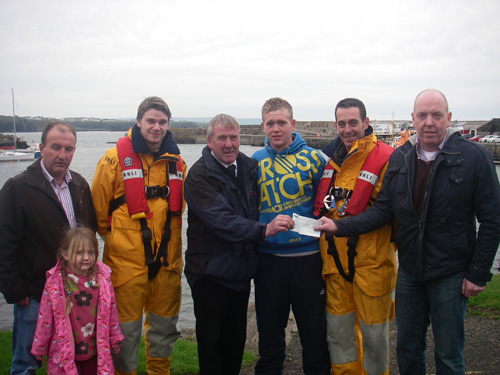
Related Safety posts
RNLI Lifeboats in Ireland
Safety News
Rescue News from RNLI Lifeboats in Ireland
Coast Guard News from Ireland
Water Safety News from Ireland
Marine Casualty Investigation Board News
Marine Warnings
Special Plaque Remembers Portrush Lifeboat Tragedy
The three volunteer crew men who lost their lives were James McAlister, a local fisherman, William McNeill and Galbraith Hamilton Grills, the Chief Officer of the Coastguard at Portrush.
To-day on the anniversary of that tragic night, William McNeill's great grandson Ronald Handy and his wife Lily presented the Station with a plaque in memory of the three crew men who lost their lives on that November night in 1889.
On an interesting note, Tracey McAlister the great great granddaughter of James McAlister is presently the press officer for Portrush Fundraising team, thus continuing the family links with the Lifeboat.
Portrush Surf Cam Goes Live
Surfing action from Portrush can now be enjoyed from all around the world following the launch of a live webcam at Whiterocks Beach.
Martin Kelly of Portrush Surf School teamed up with the town's Royal Court Hotel to set up the webcam at the popular surfing spot as a tool for travelling waveriders to check out conditions from a distance.
"By checking the webcam they can now see first hand exactly what the waves are doing, saving them time and money on a potentially wasted journey," the former Irish surfing champion told the Coleraine Times. "This is a case of know before you go."
The movable camera will allow for many different views of the Co Antrim beach that will surely appeal to more than surfing fans.
To view the webcam visit www.portrushsurfschool.com


























